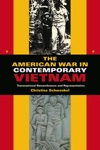 Public memory is how a nation views its history. The United States’ public memory sees the Vietnam War as a struggle to contain communism that was traumatic for American society. Vietnam’s public memory is manifest in its museums, war memorials, military cemeteries, art and photography exhibits and battlefields. For the Vietnamese, the war was waged not over the spread of communism, but was the result of U.S. imperialism and part of a 30-year independence struggle.
Public memory is how a nation views its history. The United States’ public memory sees the Vietnam War as a struggle to contain communism that was traumatic for American society. Vietnam’s public memory is manifest in its museums, war memorials, military cemeteries, art and photography exhibits and battlefields. For the Vietnamese, the war was waged not over the spread of communism, but was the result of U.S. imperialism and part of a 30-year independence struggle.
This fluid historical memory of the war has changed, caused by social and political forces, including Vietnam’s desire to participate in the global economy. The tension between U.S. pressures for Vietnam to adopt free market capitalism and Vietnam’s desires to keep its political and economic sovereignty is a major theme of Schwenkel, an anthropologist who has engaged in extensive fieldwork in Vietnam. For the Vietnamese, the value in reconciliation is to bring about a more prosperous future.
The author also offers analysis of American veterans who return to Vietnam, who are seen (or, at least, portrayed in Vietnam) as repentant seekers of forgiveness. Schwenkel examines visual images of the war, and discourses on the contrast between images in the U.S. media, which portray violence and suffering, with pictures produced by “revolutionary” photojournalists, who are likely to include more sanguine images of wartime. In an example of “transnational remembrance,” Schwenkel shows how battlefield tours have to be presented in a way attractive to tourists, including Americans, and how museum exhibits on American “war crimes,” common right after the war, were removed as U.S.-Vietnamese relations improved.
The American War in Contemporary Vietnam describes the ongoing struggle inside today’s Vietnam over memory and history. American influence and capital is a price the Vietnamese are willing to pay. Today the struggle is between the influence of American capitalism and Vietnamese socialism; previously the same struggle took place on the battlefields of Southeast Asia.
The author employs the scholarly vocabulary of anthropology and post-modernism and favors the anti-imperialist vocabulary used by the Vietnamese. This is done deliberately “to dislodge U.S. perspectives in order to take the reader on an ethnographic journey through dominant modes of narrating and representing Vietnamese history.” In spite of her claims of nonalignment, the effect is a narrative that appears sympathetic to the Vietnamese and critical of the United States. While the specialized vocabulary makes for a challenging reading experience, Schwenkel’s exploration, comparison and analysis of “public memory” of the Vietnam War is thought-provoking and provocative.
Indiana University Press, 2010




